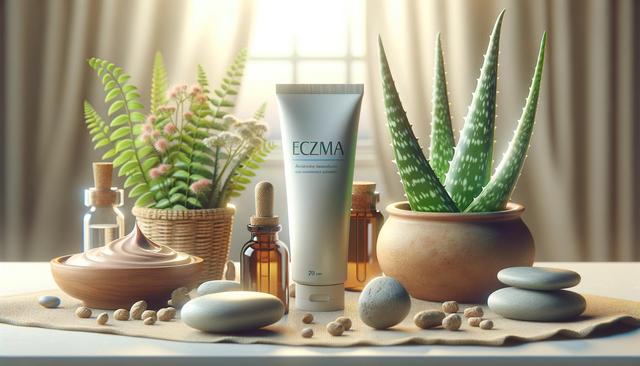Understanding Facial Eczema and Its Triggers
Facial eczema, a form of atopic dermatitis, affects the delicate skin on the face and can be especially uncomfortable due to its visibility and sensitivity. This condition can result in redness, flaking, inflammation, and persistent itching. Understanding the root causes and triggers of this skin issue is essential to finding relief. Common triggers include environmental factors such as extreme weather, pollution, and allergens, as well as internal factors like stress, hormonal changes, and diet.
Paying attention to what causes flare ups can help in managing chronic face eczema naturally. A skincare routine tailored to your specific triggers and skin type plays a crucial role. For many individuals, avoiding common irritants such as harsh soaps, fragrances, and alcohol-based products can help reduce flare ups.
- Keep a symptom journal to track flare up patterns
- Avoid known allergens and irritants
- Maintain a consistent skincare routine
By identifying and managing triggers, you can support your skin’s natural barrier and reduce the frequency of eczema episodes.
Effective Face Eczema Treatment Options
When it comes to face eczema treatment options, the goal is to calm the skin, reduce inflammation, and restore moisture. Treatments range from over-the-counter creams to prescription medications, depending on the severity of the symptoms. However, many individuals benefit from a combination of topical solutions and lifestyle changes.
Highly rated face eczema treatment options often include ingredients like:
- Colloidal oatmeal – known for its soothing properties
- Ceramides – help restore the skin’s natural barrier
- Hyaluronic acid – provides deep hydration without irritation
- Licorice root extract – helps with inflammation
In addition to topical treatments, some people explore natural remedies such as cool compresses and diluted apple cider vinegar rinses, but these should be used cautiously and with guidance from a dermatologist. The key is to choose products that are specially formulated for facial use to avoid further irritation.
Choosing the Best Creams for Facial Eczema
Finding the best creams for facial eczema means looking for products that are gentle, fragrance-free, and dermatologically tested. Not all moisturizers are suitable for eczema-prone facial skin, so it’s important to select creams that are specifically formulated for sensitive areas.
Creams that support skin healing and hydration without clogging pores are typically preferred. Look for labels that mention suitability for eczema-prone or sensitive skin. Some common characteristics of effective facial eczema creams include:
- Non-comedogenic and hypoallergenic
- Free of parabens, dyes, and synthetic fragrances
- Formulated with anti-inflammatory and barrier-repair ingredients
Consistency is key. Apply creams after cleansing and before bed to lock in moisture overnight. Layering with a gentle serum under the cream can also enhance hydration and absorption.
How to Soothe Eczema Flare Ups on Face
Flare ups can be sudden and frustrating, but knowing how to soothe eczema flare ups on face can make a major difference in comfort and appearance. Immediate actions can help calm the skin and prevent the flare up from worsening. Start by gently cleansing with lukewarm water and a mild, non-foaming cleanser to avoid stripping natural oils.
Apply a calming moisturizer or cream immediately after cleansing to help seal in moisture. During a flare up, it’s also helpful to:
- Use cold compresses to reduce inflammation and itching
- Avoid makeup or switch to fragrance-free, hypoallergenic options
- Limit sun exposure and always use mineral-based SPF
Refrain from scratching, as this can worsen the condition and lead to infections. If over-the-counter solutions aren’t effective, consult a healthcare provider for stronger treatments, including medicated creams or ointments.
Gentle Skincare for Sensitive Eczema Skin
Maintaining a daily routine of gentle skincare for sensitive eczema skin is essential for both prevention and healing. This includes using products that cleanse, moisturize, and protect without causing further irritation. Choose skincare items labeled for sensitive skin, and always patch test new products before full application.
A gentle skincare routine might include:
- Mild, sulfate-free cleansers
- Alcohol-free toners with calming ingredients like chamomile
- Barrier-repair moisturizers applied twice daily
- Sun protection with zinc oxide or titanium dioxide
Managing chronic face eczema naturally also involves lifestyle habits such as staying hydrated, eating an anti-inflammatory diet, and reducing stress through relaxation techniques. Combining internal wellness with external care creates a balanced approach to skin health.
Conclusion: Supporting Healthier Skin with the Right Care
Living with facial eczema can be challenging, but with the right knowledge and care, comfort and confidence are within reach. By exploring face eczema treatment options that suit your skin’s unique needs, using the best creams for facial eczema, and learning how to soothe eczema flare ups on face, you can reduce discomfort and support healing. Incorporating gentle skincare for sensitive eczema skin and managing chronic face eczema naturally will help maintain a calm, healthy complexion. Consistency, patience, and the right products make a meaningful difference in daily skin health.




Leave a Reply